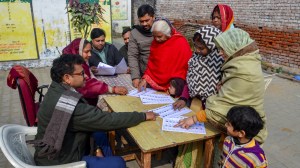Russian wheel of fortune
History is not always about remembering; it is also about forgetting. The adage seems to hold true for a Russia stripped of its superpower s...

History is not always about remembering; it is also about forgetting. The adage seems to hold true for a Russia stripped of its superpower status and striving hard to be counted among the world8217;s powerful. It appears willing to emerge from the shadows of its grandiose past: it talks free trade, makes a strong case about joining the WTO, favours liberal capitalism and is keen to build bridges with the world. But Russia also remembers VE Day, as the large crowds of uniformed people on the streets leading into Moscow, the patriotic jingles of military bands, and WW-II flicks playing on TV, signified. On May 9, Moscow was in the mood to chase away rain clouds and remember an old war.
For Russia, Victory Day was about celebrating the idea of being Russian. That in no way meant re-erecting the broken statues of Lenin. But there was also no attempt to adopt a Germany-like project of offering an apology for the misdeeds of a Soviet past. If the Baltic countries felt chided by the grand V-Day festivities, so be it. The Americans can make their noises about 8220;true8221; democracy but as long as its president keeps his date with Moscow on May 9, that was no issue. The dwindling number of war veterans may have resented the loss of the privileges they once enjoyed, but that also does not matter as long as they don their colours and climb the truck that parades them before 56 world leaders at the Red Square.
The cosmetics of new Russia is what8217;s interesting. It8217;s powerful, glittering and, in its way, inspiring. Those who had seen the Soviet Union at its peak admit that Moscow has never looked so bright. The neon lights, streets filled with some of the richest casinos in Europe, an array of consumer goods to choose from and a youth who seem to prefer beer to vodka. The change is for certain and even if life for the ordinary Russian is no longer that secure, the public gaze is on the opportunities of the market.
There was a time, an official recalls, when people would visit supermarkets carrying their 8220;perhaps bag8221;. Since one could never be sure of what was available, there was a tendency to hoard. That was where the bag came in. Today, it has been discarded. Once, there were instances when one would step out for lunch and find the restaurants shut with boards reading: 8220;lunch interval8221;! Today, the cafes are numerous and open late into the night, the supermarkets are full of goods and cars of all makes roam the streets.
But change hasn8217;t come without problems. The city has got expensive. The Russian mafia is thriving. Crime is on the rise. And people have less time to be polite. Moscow, today, is regarded as unsafe by many foreign missions and even given to racial targeting. Yet one can still take a drive up the Lenin hill on a clear night and watch scores of excited young Russians look down at a sprawling city, with Stalin8217;s seven sisters dotting the skyline and cruise boats on the Moscow river, and believe the future holds promise.
- 01
- 02
- 03
- 04
- 05































